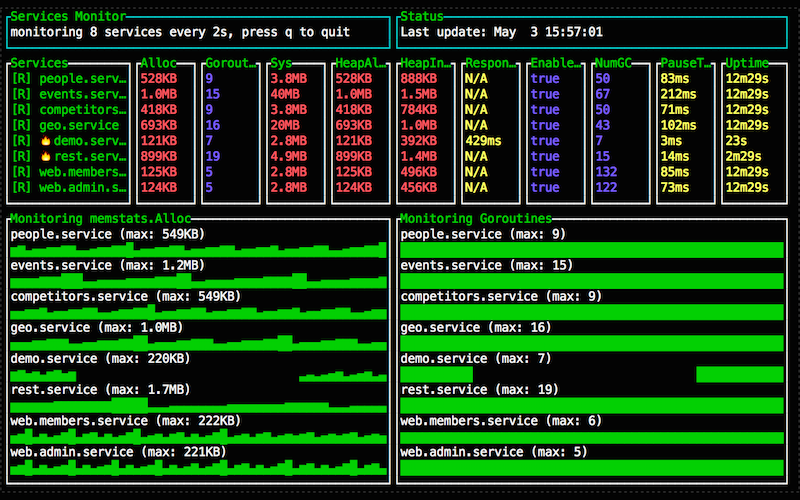概述 #
expvar 包为公共变量提供了一个标准化的接口,如服务接口中的访问计数器。
包提供了 HTTP 接口并以 JSON 格式输出这些变量,接口的 URL 路由是 /debug/vars 。
最重要的是,操作这些公共变量是原子的,这意味着我们不需要考虑并发带来的问题。
例子 #
接口状态码计数器 #
package main
import (
"expvar"
"fmt"
"log"
"math/rand"
"net/http"
"time"
)
var (
ok = expvar.NewInt("200") // 200 计算器
notFound = expvar.NewInt("404") // 404 计数器
serverError = expvar.NewInt("500") // 500 计数器
)
func helloWorld(w http.ResponseWriter, r *http.Request) {
_, err := fmt.Fprintf(w, "hello world")
if err != nil {
log.Fatal(err)
}
ok.Add(1) // 增加 200 计数器
}
// 为了模拟 404, 500 错误
// 随机返回 Http Code [200, 404, 500]
func random(w http.ResponseWriter, r *http.Request) {
rand.Seed(time.Now().UnixNano())
n := rand.Intn(3)
var code int
switch n {
case 0:
code = http.StatusOK
ok.Add(1) // 增加 200 计数器
case 1:
code = http.StatusNotFound
notFound.Add(1) // 增加 404 计数器
case 2:
code = http.StatusInternalServerError
serverError.Add(1) // 增加 500 计数器
}
w.WriteHeader(code)
}
func main() {
http.HandleFunc("/", helloWorld) // 默认返回地址
http.HandleFunc("/random", random) // 随机返回状态码地址
log.Fatal(http.ListenAndServe(":8080", nil))
}
代码简要说明 #
- 首先使用
expvar包初始化了 3 个计数器变量 - 接下来定义了两个 HTTP 路由回调方法
- helloWorld() 负责处理默认路由
/ - random() 负责处理随机返回状态码路由
/(主要用这个来做测试)
- helloWorld() 负责处理默认路由
- 最后,分别设置了路由的回调方法,并且监听端口
8080
访问 URL 增加计数器的值 #
访问默认地址 #
访问: http://localhost:8080/
正常情况下页面刷出 "hello world"
访问回调地址 #
访问: http://localhost:8080/random
正常情况下页面刷出 [200, 404, 500] 中的一个
重复访问回调地址 #
不断刷新页面,访问: http://localhost:8080/random
查看统计结果 #
访问 expvar 包内置的 URL: http://localhost:8080/debug/vars
{
"200": 15, // 200 计算器
"404": 3, // 404 计算器
"500": 7, // 500 计算器
...
...
"memstats" { // 内存值
...
...
}
...
可以看到,输出结果最上面的 3 行就是 3 个计数器变量。memstats 包表示的是内存相关信息, 感兴趣的读者可以查看 runtime.MemStats 文档。
小结 #
这一小节介绍了 expvar 包的作用以及特性,并且用一个 接口监控 的例子作为演示。
读者可以在这个基础上继续开发,比如增加 IP 计数器 URL 计数器 等功能,想要深入的读者,可以看看这个开源项目。


